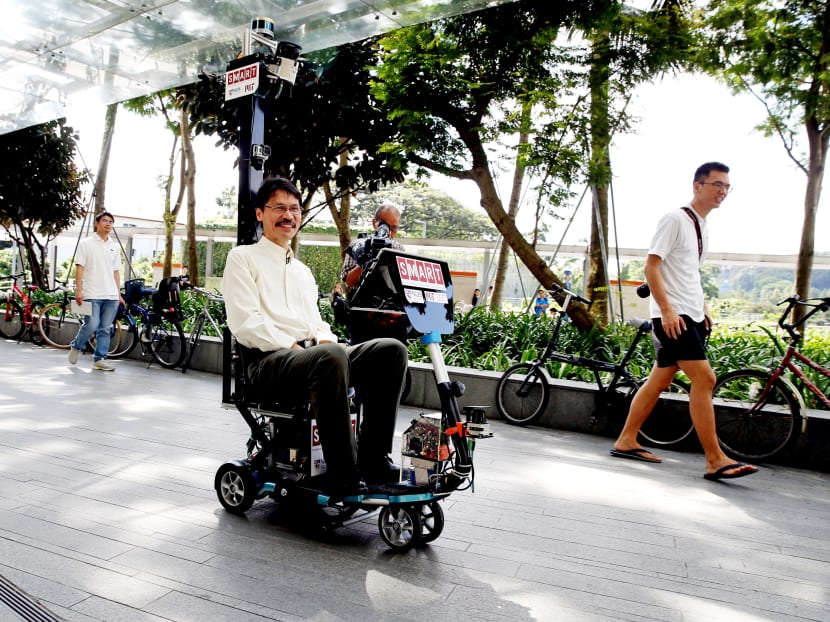Self-driving electric scooter gearing up for public trials
SINGAPORE — Engineers here are stretching the first-and-last mile concept to see how small a self-driving vehicle they can create, as they showed off a four-wheel, self-driving electric scooter on Thursday (Nov 17) that can zip around in tighter spaces in corridors within and between buildings.

NUS Associate Professor Marcelo Ang using the self-driving electric scooter in a demonstration yesterday. Its features include the ability to slow down when it detects obstacles up to 2.5m in front of it. Photo: Koh Mui Fong/TODAY
SINGAPORE — Engineers here are stretching the first-and-last mile concept to see how small a self-driving vehicle they can create, as they showed off a four-wheel, self-driving electric scooter on Thursday (Nov 17) that can zip around in tighter spaces in corridors within and between buildings.
The S$15,000 prototype can help people with mobility problems, such as the elderly and persons with disabilities, move from their homes to, and from, the nearest bus or train station in the future.
It was built by a four-member team from the Singapore-MIT Alliance for Research and Technology (Smart) at the National University of Singapore (NUS).
Work to map areas popular with the elderly has already started in Taman Jurong, Sembawang and Queenstown, so it will not take too long before the scooter, which has a maximum speed of 6kmh, can start its public trials, said NUS Associate Professor Marcelo Ang, the co-principal investigator at Smart.
Dr Ang, who came up with the idea, said he worries about his own limited mobility in the future, when he would become too old to ride his foldable two-wheel e-scooter.
The 57-year-old is already finding it disturbing that many of his friends, who are just a few years older than him, “stay at home and watch television all day” as they do not want to trouble their children even if they do want to head out.
“It’s very sad because they still have the potential to lead meaningful lives and contribute to society if you give them mobility,” Dr Ang said.
The driverless technology will also help senior citizens who are not comfortable with responding to incoming human traffic when navigating a personal mobility device, he added.
The self-driving scooter, which is still at an early stage of research, slows down when it detects obstacles up to 2.5m in front of it, and has a 0.2 second response time to such obstructions.
The scooter will also come to a stop when there is an object 10cm away from its side.
It can also go to only pre-programmed places, which currently include 10 stops in University Town at NUS.
Before the scooter can be used, a booking must first be made through a web application, with the user selecting the pick-up or drop-off points from among the 10 stations.
Dr Ang and his colleagues took two months to put together their invention, as the scooter uses the same driving algorithm and sensor configuration as the driverless golf buggy and car that Smart had devised earlier.
Dr Ang said his team’s next plan could be to retrofit the system onto a bus to make it autonomous.
Being a prototype, the self-driving scooter comes with limitations, such as an inability to reverse, and the lack of charging ports on campus.
A person can ride the scooter continuously for up to five hours, or about 20km, before it runs out of battery power.
Also, the scooter has a tendency to stay in the same spot when there are no alternative routes detected, and this could become a problem in more crowded spaces.








